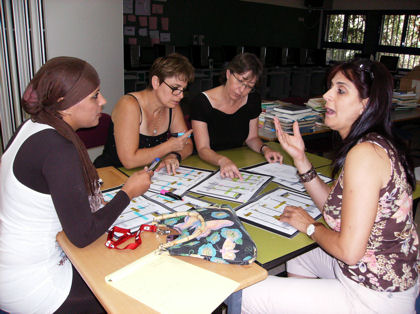Home > Oasis of Peace > Projects & Outreach > Children’s Educational System > Easing the transition: the Student Mentor Project
Easing the transition: the Student Mentor Project
Saturday 11 August 2007

The initiators
July 12, 2007 - The 2006-07 academic school year marked the first Student Mentor Project to be carried out at the Neve Shalom - Wahat al-Salam Primary School. The project was initiated by the Social Activities coordinators, Leora Erez and Fatin Zenati, and was brought to fruition by the school’s motivated teachers, including Reem Nashef, who conducted the project with her 5th grade class.
On July 12th, less than a month into their summer break, these three women were already back in the classroom, actively engaged in planning the calendar for the upcoming school year. They were more than eager to discuss how the project went in its first year of implementation.
Their mission
Leora and Fatin explained that they proposed the Student Mentor Project last summer in order to ease the transition for 1st grade students, from kindergarten to the NSWAS Primary School. The aim was to make the school a friendlier, more welcoming environment for the newcomers. The original idea was for the 6th graders each to “adopt” a 1st grade student, becoming a student mentor in their last year at the NSWAS primary school. During the planning stages, however, Leora and Fatin decided to include the 2nd and 5th grade classes as well, making each 5th grader the student mentor of a 2nd grade mentoree.
The student mentor/mentoree pairs were determined by their home room teachers with the idea that each pair would consist of an Arab and a Jew. In some instances, however, this was not feasible due to language barriers and an asymmetrical number of Jewish and Arab participants. The teachers expected that the 5th and 6th grade student mentors would spend at least one hour per week with their mentorees during the classroom recesses. Each student was given a weekly homework assignment to write about the activities and games they were engaged in with their mentor/mentoree.
An encouraging reception
In one of the weekly assignments written by a boy in the 1st grade, he stated that his student mentor made the recess a more enjoyable place to be; he said that his 6th grade mentor acted as a sort of “protector” on the playground. This sentiment was echoed by other 1st and 2nd grade students as well. As for the 6th and 5th grade students, most claimed that the mentor project made them feel more responsible and they came to think of their mentorees as their own little sisters or brothers.
To Reem’s astonishment, she perceived that most mentor/mentoree pairs spent a great deal of time together beyond the requisite hour per week. The students would play games at recess, carry out art and handicraft projects and mentors would tutor and help mentorees with their homework. Moreover, during the holiday season last year, the 6th grade class (on their own) decided to give home-made Christmas gifts to their 1st grade mentorees in order to educate the Muslim and Jewish students on Christmas traditions.
A rich and rewarding experience
Fatin, Leora and Reem were all enthusiastic about the project’s success in its first year, evident by the positive feedback received by the students. Still, they have decided to conduct the Student Mentor Project with only 1st and 6th graders for the 2007-08 school year. Reem explained that even whilst her 5th grade students, particularly the girls, enjoyed spending time with their 2nd grade mentorees, they tended to lose interest when it came to writing about their experiences, which allows them to assess and reflect on the utility of the program. Nonetheless, Reem looks forward to implementing the project for a second time with her class, as she will move on to the 6th grade and teach her same students from last year.
In many ways, the Student Mentor Project went above and beyond even the highest expectations of the teachers and staff. As hoped, the 1st grade students were welcomed into a more hospitable learning environment, making the passage from preschool to primary school a smoother transition. Furthermore, it gave the school’s seniors, the 6th graders, an opportunity to leave their legacy at the NSWAS Primary School before venturing off to the outside world for middle and high school. Leora, Fatin and Reem have concluded that the Student Mentor Project contributes to a richer, more rewarding experience for the students of the NSWAS Primary School.
